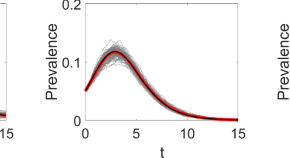Inferring Parameters of Pyramidal Neuron Excitability in Mouse Models of Alzheimer’s Disease Using Biophysical Modeling and Deep Learning
Authors (first, second and last of 7)

Collection
This special issue highlights the development of novel data-driven methods, including statistics, machine learning, parameter estimation, and uncertainty quantification, and combinations thereof, towards modeling biological systems. These newly developed methods will tackle challenges that are commonly encountered when modeling real-world experimental, field, pre-clinical, or clinical data. Examples of such challenges include high dimensionality, computational complexity, observation or process error, model bias, and intra- or inter-individual heterogeneity. Contributions to this special issue require validation of new methods with real-world data or simulated data sets that contain features of real-world data that exemplify an outlined modeling challenge. Papers should include a discussion justifying why the developed method is novel and not an application of previously developed methods, as well as how the method may be broadly applicable across different areas of biology, including medical, ecological, genetics, and epidemiological applications.
All submitted papers should include a cover letter that explicitly explains (i) the novelty of the developed method and (ii) how it may be broadly applied to various areas of biology.
Prof. Kevin Flores is an associate professor in the Department of Mathematics and is a member of the Center for Research in Scientific Computation at North Carolina State University. Prof. Flores’ research focuses on mathematical modeling, optimal experimental design, machine learning, and uncertainty quantification with applications to precision medicine, systems and synthetic biology, and environmental toxicology.
Prof. Ruth Baker is a Professor of Applied Mathematics at the Mathematical Institute, University of Oxford. Prof. Baker’s research focus is on developing and applying novel mathematical and computational methodologies and modelling frameworks for investigating developmental biology systems at the cell and tissue level.
Prof. David Bortz is a Professor in the Department of Applied Mathematics at the University of Colorado Boulder. Prof. Bortz’s research focuses on the methodology of data-driven modeling with applications to cellular migration, infectious diseases, and bacterial community population dynamics and biomechanics.
Prof. Casey Diekman is an Associate Professor in the Department of Mathematical Sciences at the New Jersey Institute of Technology. His research focuses on data assimilation, biophysical modeling, dynamical systems analysis, and deep learning methodologies with applications to neuroscience and circadian rhythms.
Prof. John Nardini is an Assistant Professor in the Mathematics and Statistics department at The College of New Jersey. Prof. Nardini’s research focused on the development, analysis, and application of novel methods to enable data-driven modeling from biological data. In particular, he applies concepts such as equation learning and topological data analysis to understand biological phenomena in cell biology, development, and cancer.
Prof. Erica Rutter is an Assistant Professor in the Department of Applied Mathematics at the University of California, Merced. Her research combines data-driven mathematical modeling, statistical analysis, and machine learning to investigate biological applications such as cancer, epidemiology, and ecology. She is interested in developing methods to combat missing data and data sparsity.









